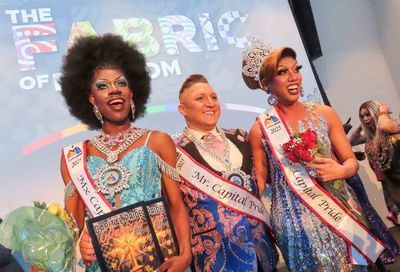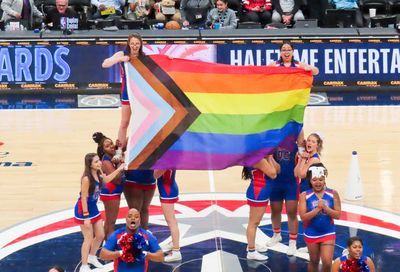Crawl Space
A Fantastic Voyage through the Colossal Colon
 |
“I’m pooped,” I thought — fully aware of and quite pleased with my double entendre — as I crawled out of the Colossal Colon.
The prized centerpiece of the Colossal Colon Tour, an interactive, multimedia colorectal health awareness project, made its home downtown on Freedom Plaza for several days last week (alas, a bit too far from the White House for maximum comedic effect) in conjunction with National Colorectal Cancer Awareness Month.
And I was indeed drained, physically and mentally, by the experience. It’s no small feat to psych yourself up to go face-to-face with a 40-foot-long, 4-foot-high replica of the human colon, the last stop on food’s digestive journey before it hits the rectum en route to the — what’s the clinical term? Ah, yes — crapper.
Getting started, I felt like a piece of meat — for the first time in years — as I hunkered down to inch my way on hands and knees past startling renderings of the pitfalls of colorectal health: a cluster of polyps here, a bout of internal hemorrhoids there. What’s that ahead? Crohn’s Disease? Noooooo!
Yet despite its graphic depictions, the Colossal Colon, a project of the Alexandria-based Cancer Research and Prevention Foundation that’s on a nationwide tour through November, is proving to be a popular educational tool to help the American public overcome its collective resistance to giving colorectal cancer prevention issues their due.
Colorful exhibits surrounding the Colossal Colon emphasize that colorectal cancer is the second-leading cause of cancer-related deaths for men and women combined, although it boasts a prevention and treatment rate of over 90 percent when detected early. Colorectal screening tests are recommended beginning at age 50, although certain risk factors — including personal or family history of benign colorectal polyps, colorectal cancer or inflammatory bowel disease, as well as tobacco use, excessive alcohol consumption, obesity and sedentary lifestyles — may necessitate screening at earlier ages.
In fact, the Colossal Colon is the brainchild of a 27-year-old colon cancer survivor, Molly McMaster, who received a misdiagnosis of severe abdominal pain when she was an otherwise healthy, 22-year-old college student that delayed proper medical treatment until she had stage II colon cancer. McMaster also lost her friend Amanda Sherwood Roberts to colon cancer at the age of 27.
Kathleen DeBold, executive director of The Mautner Project for Lesbians with Cancer, saw the Colossal Colon as a great opportunity to supplement Mautner’s own colorectal cancer awareness activities, so Mautner joined a battalion of local health groups organized to provide volunteer and publicity support for the Washington stop on the Colossal Colon Tour.
“We wanted to keep [the Colossal Colon] gay-friendly,” says DeBold, who’s lost a grandmother, aunt and uncle to colon cancer. “Plus, we know it’s a hard issue to talk about. People say, ‘Oh, I have a cough, or an earache.’ But we don’t want to say, ‘I have bloody stools.’ Marketing it this way so it’s fun, and gets people talking about it, is really cool.”
Make that colossally cool.
To learn more about colorectal health issues, visit www.CheckYourInsidesOut.org and www.PreventCancer.org.
Support Metro Weekly’s Journalism
These are challenging times for news organizations. And yet it’s crucial we stay active and provide vital resources and information to both our local readers and the world. So won’t you please take a moment and consider supporting Metro Weekly with a membership? For as little as $5 a month, you can help ensure Metro Weekly magazine and MetroWeekly.com remain free, viable resources as we provide the best, most diverse, culturally-resonant LGBTQ coverage in both the D.C. region and around the world. Memberships come with exclusive perks and discounts, your own personal digital delivery of each week’s magazine (and an archive), access to our Member's Lounge when it launches this fall, and exclusive members-only items like Metro Weekly Membership Mugs and Tote Bags! Check out all our membership levels here and please join us today!


















